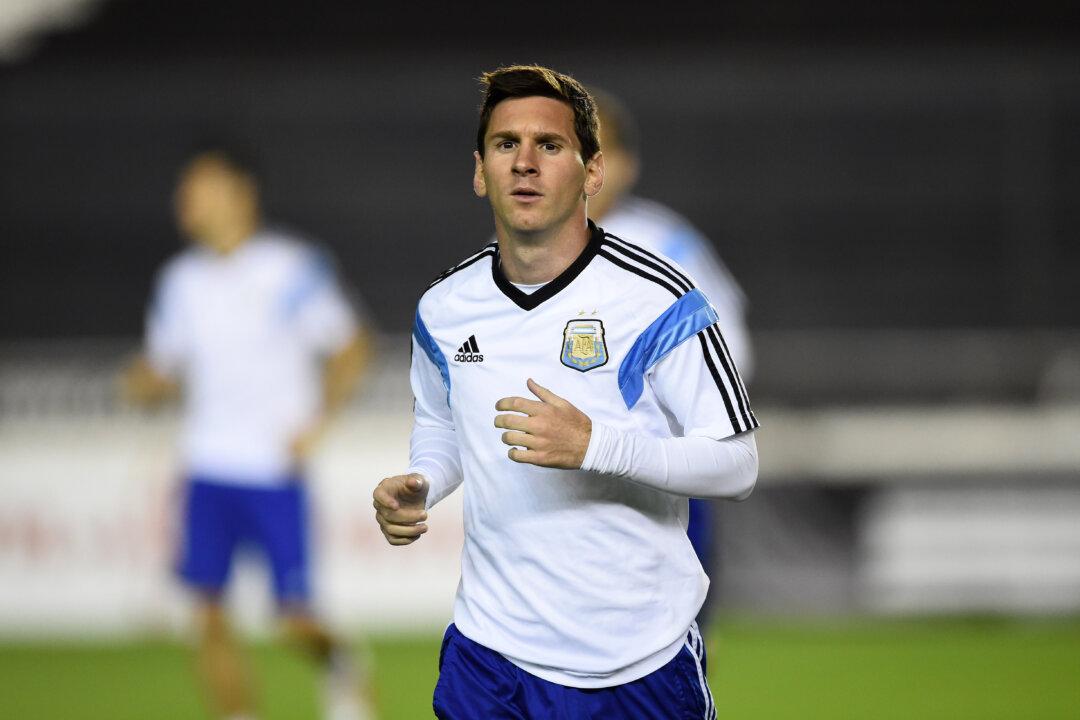Germany and Argentina have announced their starting lineup for the World Cup 2014 final.
Both sides have named the same starting eleven as in their respective semi final matches.
Argentine midfielder Angel di Maria was doubtful to play after suffering a thigh injury in the quarter final, as will not be starting against Germany.
Meanwhile, Germany’s Mats Hummels will start, despite concerns that he would not recover from a knee injury that he picked up in the semi final.
Germany
Manuel Neuer, Philipp Lahm, Mats Hummels, Jerome Boateng, Benedikt Höwedes, Bastian Schweinsteiger, Sami Khedira, Thomas Müller, Toni Kroos, Mesut Özil, Miroslav Klose
Argentina
Sergio Romero, Pablo Zabaleta, Martin Demichelis, Ezequiel Garay, Marcos Rojo, Lucas Biglia, Javier Mascherano, Enzo Perez, Ezequiel Lavezzi, Lionel Messi, Gonzalo Higuaín
Terrific World Cup ends with marquee final
RIO DE JANEIRO (AP) — The World Cup ends Sunday with a marquee match-up, Argentina against Germany, and host Brazil rushing to be ready for an even bigger logistical challenge: the 2016 Olympics.
As the winning captain, either Argentina forward Lionel Messi or Germany defender Philipp Lahm will hold aloft the most recognized trophy in sports in front of 74,000 spectators at the Maracana Stadium, the world-famous football venue nestled among Rio de Janeiro’s hills, high-rises and favelas.
Even Pope Francis is keeping an eye from the Vatican. The Argentine-born, football-loving pontiff pledged neutrality, promising not to pray for any team. However, Francis did tweet on the eve of the final: “The World Cup allowed people from different countries and religions to come together.”
It also showcased Brazil, good sides and bad. With $13 billion in spending, last-minute scrambling and what Brazilians call “jeitinho,” their famous ability to improvise solutions, South America’s largest country pulled together a tournament across 12 far-flung host cities.
That was encouraging for Olympic officials concerned that Rio is slipping with preparations for the 2016 Games. Visiting Rio and its Olympic village-to-be, International Olympic Committee President Thomas Bach praised Brazilians’ “passion and efficiency” and their first World Cup in 64 years.
The 32-day tournament will be remembered for terrific football and because it went so smoothly, with no logistical disasters for the 32 teams and hundreds of thousands of traveling fans. There also was no repeat of giant public protests that unsettled last year’s warm-up tournament, the Confederations Cup.
However, the overwhelmingly white and seemingly well-off stadium crowds reflected Brazil’s stark economic inequalities. This was a World Cup that Brazil’s black and mixed-race poorer citizens mostly saw from afar on television.
Broken promises of new subway lines and other life-improving infrastructure to accompany the 12 all-new or renovated World Cup arenas reflected poorly on Brazil’s bureaucracy, as did accusations that corrupt public servants skimmed off funds. An unfinished overpass collapsed, killing two people, in the host city of Belo Horizonte where, days later, Germany humiliated Brazil, drawing floods of tears across this nation of 200 million people.
Brazilians will long rue that historic 7-1 loss in the semifinals and think the humiliation might have been avoided had a back injury not robbed them of Neymar, Brazil’s best player. Compounding their regret, Brazil also lost 3-0 to the Netherlands in Saturday’s match for third place.
Brazil’s president, Dilma Rousseff, and FIFA president Sepp Blatter will together present the trophy to the winners. It isn’t, in fact, a cup but an 18-carat gold sculpture of two athletes, with arms raised, holding the Earth. At 6.1 kilograms (13.6 pounds), it is heavier than a newborn baby. FIFA engraves the name of the winners on the base of the trophy but doesn’t let them keep it, instead giving them a gold-plated replica.
Such is the intensity of their footballing rivalry with Argentina that many Brazilians will pray Germany wins its fourth World Cup and first since 1990.
“It is absurd for Brazilians to root for Argentina. This cannot be,” said Renata Braga, a fan in Rio.
Germany’s slick, attacking, disciplined football made it arguably the most entertaining team in Brazil. With 17 goals before the final, it was the highest scorer.
Argentina wasn’t as flashy but rode the genius of Messi, the four-time world player of the year having his best World Cup.
If the finalists score two more between them Sunday, this World Cup will have produced more goals than any of its 19 predecessors.
Victory for Argentina would take its total of titles to three, still two short of Brazil’s record five.
A first World Cup win for Messi would add fuel to incessant arguments between the South American neighbors about whether he and Diego Maradona, Argentina’s captain when it last won in 1986, are worthy equals to Pele, the only player to win three World Cups.
Argentine fans descended on Rio, singing Brazil-taunting songs. Since they can’t celebrate a World Cup win, second-best for Brazilians would be their neighbors going home disappointed.




